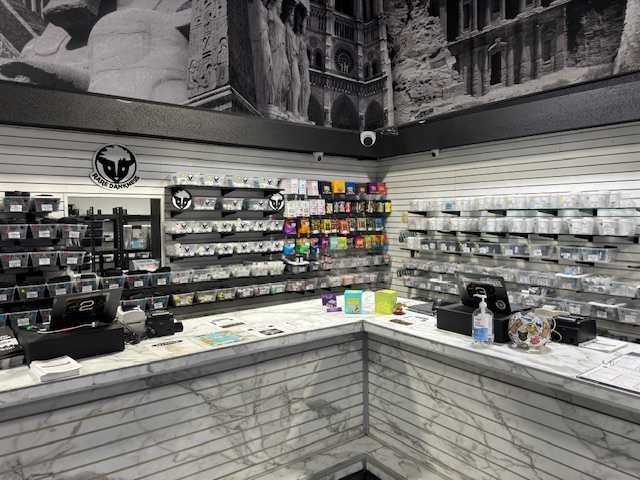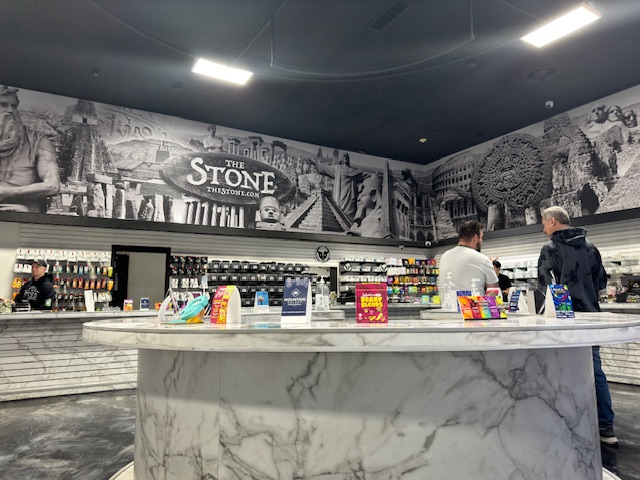
This website is for users aged 21 and over. Please confirm your age.

With the legalization of marijuana in Denver, there has been a significant impact on the tourism and hospitality industry. This section will explore the positive economic impact of legalization and how dispensary location affects hotel prices and occupancy. The rise of open dispensaries has been a controversial topic. And understanding the impact of Denver’s open dispensaries on tourism and hospitality is crucial for the industry’s growth and development.
Legalizing marijuana in Denver has made a huge positive difference to the economy. Dispensaries have helped businesses generate more revenue, which gives taxes to both the city and state. A Colorado Department of Revenue study shows that legal marijuana has brought in around $7 billion to the state’s economy and created loads of jobs.
Plus, legalization has caused tourist numbers to rise. Denver is cannabis-friendly, so people come from all over for it. This has made hotel occupancy rates go up, as well as prices. According to STR Global, areas with more dispensaries get more tourists, and this boosts the local economy.
The industry is still growing and new kinds of businesses are appearing. Denver gave out the first mobile marijuana consumption permit, so companies can work from vans or buses. Tourists can experience cannabis culture and small business owners get their share.
Initiative 300 plans to let people consume cannabis legally in social consumption establishments. If this happens, hospitality businesses will get more income, and tourism will rocket.
Legalizing marijuana has had a big impact on Denver’s hospitality and tourism industries. It’s changing all the time, so policymakers and stakeholders must pay attention and see how it affects the long-term economy. It looks like the ‘high life’ doesn’t come cheap!
The effects of dispensaries near hotels in Denver are interesting. A 2016 study looked at data from 245 hotels in the area. It was two years after marijuana was allowed for recreational use. The study showed that hotels close to dispensaries had higher occupancy rates and prices than those further away. The table below lists the average changes in occupancy rates and prices for hotels at different distances from dispensaries. Hotels within one mile of a dispensary had the most significant increases. Other factors, such as hotel amenities, also affect pricing and occupancy rates.
| Distance | Occupancy Change | Price Change |
|---|---|---|
| 0-1 mile | +12.6% | +12.5% |
| 1-2 miles | +9.4% | +4.9% |
| 2-3 miles | +4.6% | +1.3% |
Hotels close to dispensaries can use this trend to their advantage by advertising their proximity as an extra feature for visitors who consume marijuana. Hotels outside of the one-mile radius can offer packages or deals for canna-tourists.
This data on dispensary location and hotel prices/occupancy rates in Denver gives the hospitality industry new ways to draw in more guests.
Denver’s innovative marijuana hospitality businesses have been making waves in recent times. In this section, we will be exploring two of these businesses – Denver’s first mobile marijuana consumption permit and the potential boost to the canna-tourism industry with Initiative 300. With the hospitality industry taking a new turn, how these businesses impact tourism in Denver is a topic that we cannot ignore.
Denver has taken an important leap in increasing cannatourism hospitality by introducing the first ever Mobile Marijuana Consumption Permit. This new permit is in response to fresh city ordinances that designate outdoor zones for license-holders to consume marijuana while on the go.
The Mobile Marijuana Consumption Permit is a huge milestone in Denver’s journey to boosting cannatourism. Initiative 300 has been influential in enabling this innovation. This initiative allows licensed businesses to have specified consumption areas for license-holders.
Thanks to the permit system, businesses with permits can now create tours where customers can smoke or vape while travelling in buses, limousines, or other vehicles. This distinctive experience is expected to be a hit with groups wanting a special excursion. But, it has sparked worries about public safety, legal matters, and road pressure.
The first Mobile Marijuana Consumption Permit has been authorized and applied, however, there is a need to balance regulations and provide an inviting atmosphere for tourists. Initiative 300 may be the answer to perfectly striking this balance.
In conclusion, Denver has presented the first Mobile Marijuana Consumption Permit, which promises unique experiences for tourists. But there are worries about legal issues, public safety, and road pressure. Initiative 300 could be the solution to finding a balance that satisfies both tourists and involved stakeholders.
Initiative 300 has passed in Denver, providing a potential boost to canna-tourism. It permits bars and cafes to apply for permits so customers can use marijuana in their premises. This offers innovative businesses the chance to create one-of-a-kind experiences for tourists.
It is predicted that tourism related to the cannabis industry will increase. This could mean tours of grow facilities, hotels, and restaurants catered to cannabis consumers. These establishments could earn more revenue and create more jobs.
The mobile marijuana consumption permit issued in Denver shows that the city wants to encourage these businesses and experiences for tourists. As more permits are granted and cannabis-friendly spaces become common, more visitors could come for these attractions.
Hotels and dispensaries could partner up, or offer packages for cannabis consumers. Ads and campaigns targeting this demographic could bring in even more visitors.
As Denver’s marijuana legalization impacts its tourism and hospitality industry, there is need for more research. The article ‘The Impact of Denver’s Open Dispensaries on Tourism and Hospitality’ has interesting findings that require further investigation.
The article states visitors have been drawn to Denver due to its marijuana legalization. However, the data was only from a short time before and after legalizing marijuana. This timeline may not show the complete picture of the industry’s long-term effects.
The article implies negative implications on the city’s hospitality industry. Hotel prices changed along with marijuana prices, with hotels raising rates as marijuana prices increased. This needs more investigation to understand the correlation better.
Current research does not cover details and long-term effects of tourism and hospitality in Denver. So, further research is needed to fill this gap and explore the impact of marijuana legalization on Denver’s tourism and hospitality industry in greater depth.
A Penn State University study found that after the legalization of recreational marijuana in Denver, the city’s hotels saw an immediate increase of $130 million in revenue. The study also found that there was an increase in hotel prices, which contributed to the revenue boost. Positive effects were more pronounced in tourist-oriented, lower-priced hotels than in higher-priced hotels that cater to commercial travelers.
The study conducted by Penn State University found that increased visitation to the Denver area resulted in a positive economic impact, with growth in occupied hotel rooms of 9% in 2014, higher than any other year studied. Denver’s growth after legalization was above and beyond what would have been otherwise expected without legal recreational marijuana.
Denver is set to issue the first permit for a mobile marijuana hospitality business in local and national history. Kush and Canvases, a pot hospitality business owned by Sarah Woodson, is receiving the permit for a party bus that will offer marijuana-friendly travel around the city. The bus will be available for private bookings and will offer tours around the city with stops at popular Denver restaurants, head shops, and dispensaries.
According to a report on Business Insider, to be approved, Sarah Woodson had to retrofit a party bus to ensure proper air ventilation and a partition between the bus driver and guests. Marijuana hospitality businesses are banned from alcohol sales, but the bus will have pre-packaged munchies and beverages for sale, according to Woodson.
Initiative 300 is a new law passed in Denver, Colorado, that allows businesses to apply for permits that grant marijuana “consumption areas” on-site, such as coffee shops, restaurants, bars, and even yoga studios, with special permitting. Industry experts believe that this law could boost Colorado’s “canna-tourism” industry. The canna-tourism industry has taken hold since legalization in 2012, with tourists estimated to have spent $100 million at recreational marijuana stores in Colorado last year. Truman Bradley, founder of Denver dispensary chain Southwest Alternative Care and CEO of a newly launched canna-tourism group, Seed & Smith, says cannabis is a huge draw for tourists and there was no safe place to consume it until now.
A study conducted by Marijuana Business Daily found that recreational dispensaries in Denver have had an overall positive impact on the city’s tourism and hospitality industry. Guests can smoke marijuana and eat edibles in private hotel rooms without penalty. Additionally, people are seeking out lodging where they can smoke marijuana. The study also found that businesses that are run by social equity license holders and those that cater to the community are often the most successful in the industry.
We warmly welcome you to explore our highly acclaimed strains, concentrates, and edibles. Serving recreational clients with pride is our passion.
At our dispensary, you'll find a professional yet inviting atmosphere that prioritizes your comfort and privacy. Feel free to stop by at your earliest convenience to experience it for yourself. We can't wait to serve you!


